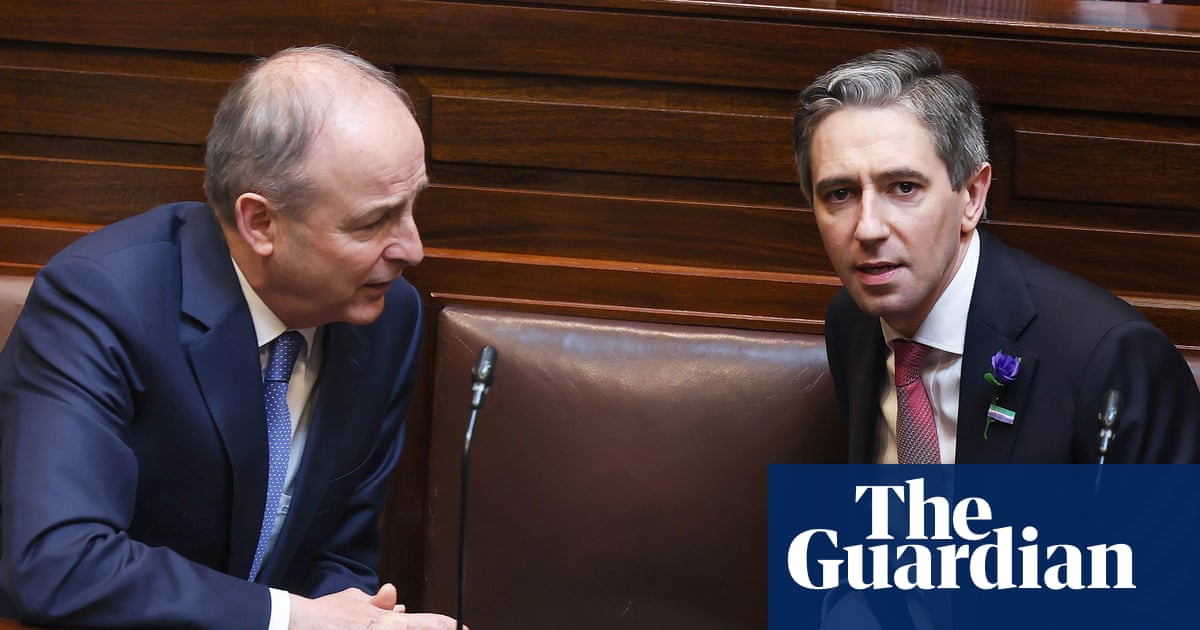Photo credit: www.theguardian.com
Formation of New Coalition Government in Ireland
In a significant political development, Ireland’s two primary centre-right parties, Fianna Fáil and Fine Gael, have successfully negotiated a coalition agreement with a number of independent lawmakers. This agreement comes six weeks after an election that dramatically diminished the Green Party’s standing in the political arena.
The coalition arrangement, finalized on Wednesday, designates Micheál Martin, the leader of Fianna Fáil, as Taoiseach (Prime Minister) for the first three years of the new five-year term, while Simon Harris, the current leader of Fine Gael, will assume the role in November 2027.
Following the November 29 election, in which both parties fell short of an outright majority and the Greens saw a severe reduction in their representation, extensive negotiations took place. The Greens, who were part of the preceding coalition, retained only one seat in the Dáil Éireann.
Under the new plan, Simon Harris will serve as deputy prime minister and will take on an expanded role in foreign affairs, focusing on international trade. This move is viewed as crucial for bolstering Ireland’s diplomatic initiatives, particularly with potential changes in the US under President Donald Trump, who has expressed intentions to bring jobs back to America.
Given the fact that Ireland’s economy heavily relies on multinational corporations from the US, such as Apple, Pfizer, Intel, and Microsoft—many of which have their European headquarters in the country—the incoming government is emphasizing the importance of maintaining strong economic ties with the United States.
Following five weeks of discussions involving Fianna Fáil, Fine Gael, and members of the Regional Independent Group, the draft programme for government was released. This document includes contributions from independent lawmakers Michael and Danny Healy-Rae, who represent County Kerry.
In a joint declaration, Martin and Harris highlighted their commitment to establishing “a strong and stable government” aimed at advancing progress in various sectors, including the economy, infrastructure, housing, and public services over the next five years.
The coalition’s comprehensive 162-page programme now awaits ratification from both parties and the independent lawmakers ahead of the Dáil Éireann’s next session, which is scheduled for Wednesday. This session will mark the establishment of Ireland’s 34th government.
James Lawless, a member of Fianna Fáil, remarked that the government’s plan addresses the pressing needs of contemporary Ireland, calling for significant investments in digitalization, sustainable energy, housing, health, and education. He stressed the importance of preparing for the potentially volatile landscape both domestically and internationally over the coming years.
One of the coalition’s primary objectives includes the ambitious target of constructing 300,000 new homes by 2030 to alleviate the severe housing shortage affecting both buyers and renters in Ireland. Furthermore, the government pledges to advance the occupied territories bill, which seeks to limit trade with Israeli settlements within occupied Palestinian territories. However, there are concerns that external pressures, notably from the United States, could challenge the bill’s progress.
In the recent election, both Fianna Fáil and Fine Gael together received 43% of the total votes, the same percentage share they garnered in 2020. Fianna Fáil emerged with 48 seats in the Dáil, compared to Fine Gael’s 38 seats, while Sinn Féin, which is historically associated with the IRA, secured 39 seats in the election.
Source
www.theguardian.com

